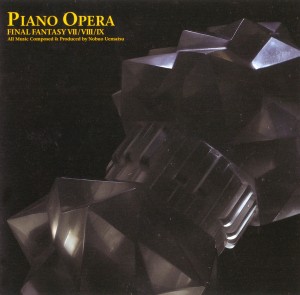Final Fantasy VII / VIII / IX Piano Opera
 |
Album Title: Piano Opera Final Fantasy VII / VIII / IX |
| Record Label: Square Enix |
|
| Catalog No.: SQEX-10432 |
|
| Release Date: April 23, 2014 |
|
| Purchase: Buy at CDJapan |
Overview
Following the trend of previous entries, Piano Opera Final Fantasy VII/VIII/IX is the latest solo piano arrangement album with Final Fantasy pieces arranged and performed by Hiroyuki Nakayama. This entry covers the three PlayStation titles, Final Fantasy VII, VIII, and IX. Although each of these games already received a Piano Collections album with arrangements by Shiro Hamaguchi, here Nakayama presents a different stylistic approach from Hamaguchi’s more interpretative arrangements. For the most part with few exceptions, Nakayama stays very close to the original tracks, providing arrangements that are true to the originals but rarely surprising or novel.
Body
Compared to his predecessors, Nakayama is much more willing to arrange battle themes for the piano. These tracks are generally quite difficult to pull off because the piano must match the intensity of the originals, or else take a very different interpretation as past arrangers have done. With the increased allotted difficulty for the Piano Opera series, Nakayama is able to faithfully reproduce the battle themes with strong chords, support in the bass, dazzling runs, and generally a full sound. The main drawback is that these pieces don’t cover much new ground, and largely come off as anyone would expect a transcription of these pieces to sound like. Thus the tracks “Fight On!”, “Man with the Machine Gun”, “Liberi Fatali”, “Festival of the Hunt”, “Force Your Way” and “Opening ~Bombing Mission~” (which all comprise half of the album!) go by with no surprises. They come off as good arrangements, but they cannot hope to overcome the originals which by their nature have more textures and greater dynamics.
It does not help in these battle tracks that Nakayama’s performances here are fairly bland, despite any impressive technical feats. For example, “Force your Way” has stunning runs and thunderous chords but it fails to impress due to its dull phrasing. Even more offensive is “Liberi Fatali” which is largely devoid of any dynamic shifts, opting to stay in the realm of forte to fortissimo throughout the nearly the entire arrangement. Even its tempo is held very strictly throughout sections where some dramatic rubato would have greatly aided the forward momentum of the piece. The placement of this generally-introductory track in the middle of the album is also quite distracting. There are some new segments such as the quiet opening buildup of “Man with the Machine Gun”, but these moments are few and far between and are unable to salvage the disappointingly dull affair of the battle track arrangements.
Nakayama also arranges some slower tracks for the album, and here he uses much more creativity and sensitive playing. “Ami”, “Not Alone”, “Rose of May”, and “Melodies of Life” were covered on their Piano Collections albums, so Nakayama attempts to provide fresh arrangements. Here “Ami” retains its delicate and relaxing sound with a few new sections written in. Notably, Nakayama gives the harmonies and time signatures more diversity and complexity than the original giving it some subtle flair and helping it stand out from Hamaguchi’s arrangement. “Not Alone” is more straightforward and emotional than the quirky Piano Collections track, taking slower legato approach. It is very in line with the original, and it has a good progression to its moving climax.
“Roses of May” is more steadily paced and is more technically challenging than Hamaguchi’s, but is unfortunately full of pointless key shifts and arpeggiations as Nakayama has been known to do when working with a short source material. By the end of the piece, the simple melody is worn down and no longer holds interest. “Melodies of Life” is straightforward like Hamaguchi’s version, similarly pleasant and enjoyable but unable to separate itself much stylistically. Some reharmonization here might have been effective as with “Ami”. The highlight of the slower pieces is likely “Words Drowned by Fireworks” which is arranged for the first time on piano here, receiving a wonderful sensitive arrangement with lots of decorations that enhance, rather than detract from the piece. Nakayama moves the melody around through the various voices and is careful to keep it central throughout the driving dynamic shifts and fluttering cascades.
Of note is “Cosmo Canyon”, which here receives a much different arrangement from the OST and from its Piano Collections sibling. In his most creative and interpretative arrangement to date in the Piano Opera series, Nakayama gives it a very harsh sound with many sudden notes, dissonant chords, and multiple distinct lines throughout. It is a technical feat and very interesting, if a bit jarring at times. It may be a bit of a hit and miss for some listeners since it is so far removed from the original atmosphere, but in the midst of largely recycled and straightforward arrangements this refreshing change should be welcome.
Summary
Hiroyuki Nakayama brings more of the same to the latest entry in the Piano Opera series. There are plenty of battle tracks that are difficult and impressive, but their arrangements are uninspired, and the dynamics and phrasing of the performances are lacking. The slower tracks sometimes don’t do enough to really stand out from previous piano arrangements, but they are still mostly good and are played with strong emotion. The strange “Cosmo Canyon” is a step in a better direction for the series in terms of arrangement, and hopefully we can see more of Nakayama’s creative muscles flex in the future. For now, Piano Opera Final Fantasy VII/VIII/IX is adequate, but not much more than that.
Do you agree with the review and score? Let us know in the comments below!
3
Posted on October 3, 2014 by Christopher Huynh. Last modified on January 19, 2016.













